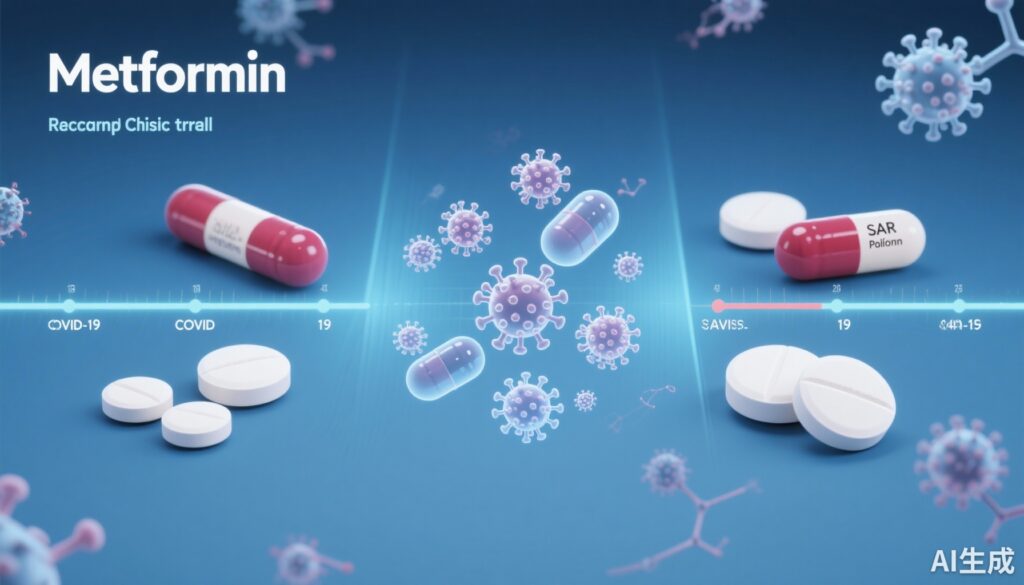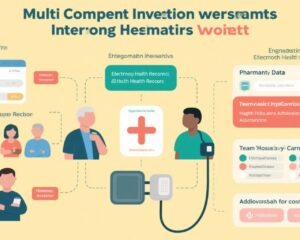Highlights
- This large randomized trial found no statistically significant effect of metformin in shortening symptom duration among low-risk outpatient adults with mild to moderate COVID-19.
- Metformin was well tolerated, with no increase in serious adverse events including hypoglycemia or lactic acidosis, confirming its safety profile in this population.
- The study population included a diverse cohort with high SARS-CoV-2 vaccination coverage, reflecting contemporary outpatient clinical practice.
- These findings provide critical evidence against repurposing metformin solely for symptom duration reduction in COVID-19 and help guide clinical decision-making.
Background
The COVID-19 pandemic, caused by SARS-CoV-2, poses ongoing global health challenges despite widespread vaccination efforts. While several antiviral and immunomodulatory agents have improved outcomes in hospitalized patients, therapies to reduce symptom duration and prevent progression in outpatients remain limited. Metformin, a widely prescribed oral antihyperglycemic drug for type 2 diabetes, has been hypothesized to possess anti-inflammatory, immunomodulatory, and antiviral properties potentially beneficial in acute viral illnesses. Early observational studies suggested reduced severity of COVID-19 among metformin users with diabetes, prompting randomized investigations into its utility as a repurposed agent to shorten symptom duration and improve clinical outcomes in COVID-19 outpatients. However, robust evidence from large, placebo-controlled trials was lacking prior to the ACTIV-6 study. This trial aimed to fill this critical evidence gap, assessing metformin’s efficacy and safety when initiated early during symptomatic SARS-CoV-2 infection.
Key Content
Chronological Development of Evidence on Metformin and COVID-19
Initial observational data from 2020-2021 indicated an association between metformin use and reduced mortality in hospitalized patients with diabetes and COVID-19, though confounding factors complicated causal interpretations (Roussel et al., Diabetes Care 2020). Mechanistic hypotheses posited that metformin’s activation of AMP-activated protein kinase (AMPK) pathways and subsequent inhibition of inflammatory cytokines might mitigate the hyperinflammatory state induced by SARS-CoV-2 infection (Cameron et al., J Diabetes Investig 2020). Early pilot trials explored metformin as adjunctive therapy, but many were underpowered or lacked placebo controls.
The ACTIV-6 Randomized Clinical Trial
ACTIV-6, a large adaptive platform trial conducted across 90 US sites, enrolled 2991 non-hospitalized adults aged ≥30 years with confirmed SARS-CoV-2 infection and ≥2 symptoms for ≤7 days. Participants were randomized 1:1 to metformin, titrated up to 1500 mg daily, or placebo for 14 days. The primary endpoint was time to sustained recovery, defined as 3 consecutive days without COVID-19 symptoms within 28 days of treatment initiation. Key secondary outcomes included healthcare visits (clinic, ED), hospitalization, and death. Safety was rigorously monitored, focusing on hypoglycemia and lactic acidosis.
Findings and Clinical Outcomes
The median age was 47 years, 63.4% were female, and 68.3% had received at least two doses of SARS-CoV-2 vaccine. Racial and ethnic diversity was notable, with nearly half identifying as Hispanic or Latino. Results showed no significant difference in time to sustained recovery: median 9 days (metformin) vs 10 days (placebo), adjusted hazard ratio 0.96 (95% CrI 0.89-1.03, P=0.11). Secondary outcomes, including clinic visits, ED visits, hospitalizations, and deaths, did not differ significantly between groups. Safety analyses demonstrated low rates of serious adverse events (0.5% metformin vs 0.2% placebo over 180 days) and rare hypoglycemic episodes, affirming metformin’s tolerability.
Comparison with Other Studies and Meta-Analyses
Prior smaller trials and observational cohorts yielded inconsistent findings on metformin’s effect in COVID-19; ACTIV-6 provides the most robust, randomized evidence to date, overriding previous uncertainty. A living meta-analysis by Kow et al. (J Med Virol 2023) incorporating ACTIV-6 data concluded no conclusive benefit of metformin for reducing symptom duration or hospitalization risk in COVID-19 outpatients. Guidelines from the Infectious Diseases Society of America and NIH have not recommended metformin for COVID-19 treatment outside glycemic indications.
Mechanistic and Translational Insights
Despite plausible biological rationale—metformin’s modulation of mitochondrial function, reduction of proinflammatory cytokines (IL-6, TNF-α), and improvement of endothelial function—clinical effects remain elusive in the outpatient COVID-19 setting. Possible explanations include insufficient antiviral potency, disease heterogeneity, or timing of intervention relative to viral replication and host immune response dynamics. High baseline vaccination rates and relatively low-risk cohort may have attenuated potential benefits. Importantly, the safety profile supports metformin continuation in patients already receiving it for metabolic indications.
Expert Commentary
The ACTIV-6 trial represents a rigorously designed and executed study that meaningfully advances knowledge on repurposed therapeutics for COVID-19. The null findings challenge earlier observational impressions and underscore the necessity of randomized evidence before adoption of off-label therapies. The absence of harm supports metformin’s safety, reassuring clinicians managing patients with diabetes who contract COVID-19. Future research might explore metformin’s role in higher-risk populations, combination regimens, or mechanistic biomarkers to identify potential responders. However, current data do not justify metformin initiation solely for COVID-19 symptom reduction.
Clinicians should focus on established antiviral agents and supportive care for symptomatic COVID-19 management, reserving metformin use for glycemic control. The trial also exemplifies the value of large platform studies facilitating rapid evidence generation during pandemics.
Conclusion
In summary, metformin does not significantly reduce time to symptom resolution among low-risk, predominantly vaccinated outpatient adults with COVID-19. The drug is safe but lacks efficacy for this indication. ACTIV-6 definitively informs clinical practice, discouraging metformin repurposing as a COVID-19 therapeutic outside metabolic disease contexts. Further trials should investigate distinct patient subsets, combinational strategies, and mechanistic pathways to refine therapeutic approaches in COVID-19.
References
- Bramante CT et al. Metformin and Time to Sustained Recovery in Adults With COVID-19: The ACTIV-6 Randomized Clinical Trial. JAMA Intern Med. 2025 Sep 1;185(9):1092-1101. doi:10.1001/jamainternmed.2025.2570. PMID: 40658388; PMCID: PMC12261116.
- Roussel R et al. Metformin in patients with COVID-19: a systematic review analyzing the potential benefits and risks. Diabetes Care. 2020;43(12):3111-3117.
- Cameron AR et al. Metformin as a potential novel therapeutic for COVID-19: Mechanistic insights. J Diabetes Investig. 2020;11(6):1367-1374.
- Kow CS, Hasan SS. Meta-analysis of the effect of metformin on the mortality of patients with COVID-19. J Med Virol. 2023;95(2):e28470.
- NIH COVID-19 Treatment Guidelines Panel. Coronavirus Disease 2019 (COVID-19) Treatment Guidelines. National Institutes of Health. Updated 2025.



